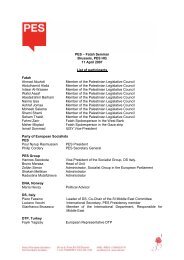Hedge funds and Private Equity - PES
Hedge funds and Private Equity - PES
Hedge funds and Private Equity - PES
Create successful ePaper yourself
Turn your PDF publications into a flip-book with our unique Google optimized e-Paper software.
174<br />
policy are not being met. This regulation is not directed at the <strong>Private</strong> <strong>Equity</strong> Funds’ financing<br />
activities, but rather at the implications of the complete range of <strong>Private</strong> <strong>Equity</strong> Fund managerial<br />
decisions upon the infrastructure operator’s public service responsibilities.<br />
***<br />
Regarding the financing activities of public utilities, industry-specific regulation will continue to<br />
be based on an assumption of effective financial governance of <strong>Private</strong> <strong>Equity</strong> Funds. In addition,<br />
governments may wish to consider whether they should retain a “golden share” of equity in all<br />
public utilities, including a seat on the board. Such shares were retained by many governments<br />
in the early stages of public utility privatisations, <strong>and</strong> some still hold them. This ensures government<br />
is informed of the utility’s plans <strong>and</strong> major decisions, <strong>and</strong> reserves the power to veto<br />
decisions they believe are contrary to the public interest. This is justified because of the importance<br />
to the general public, the economy <strong>and</strong> society of the major decisions of public utility<br />
managers <strong>and</strong> owners.<br />
However, a more effective approach may be to strengthen the industry-specific regulation in the<br />
infrastructure industries, establishing specific powers to regulate the financial as well as the<br />
operational activities of infrastructure providers. The initial requirement is to ensure full transparency<br />
to the regulator <strong>and</strong> the public with respect to all transactions that affect the<br />
implementation of the operator’s public service responsibilities, including financial transactions.<br />
For all its major financing activities, the infrastructure operator could be required to obtain<br />
advance approval from the regulator that they are in the public interest. The regulator would<br />
need broad powers to require the operator to supply all the information necessary to make the<br />
necessary public interest judgments.<br />
The strengthened regulator’s powers suggested here are not without precedent. In the past,<br />
most regulatory agencies in the US <strong>and</strong> Canada had similar strong financial regulatory powers<br />
over public utilities precisely because they were businesses in which there was a public interest.<br />
Some of these regulators retain financial powers today. A leverage buyout of an incumbent<br />
public utility operator could not take place in the US today without advance approval from one<br />
or more industry regulatory authorities.<br />
***<br />
To promote the Rhinel<strong>and</strong> model of public companies, thereby ensuring co-responsibility of all<br />
stakeholders for the future performance of the company, we could propose further initiatives:<br />
One other potential mechanism for regulating operations in the financial sector concerning<br />
employees’ social rights is the Transfers of Undertakings Directive 77/187 of 1977 (ARD). The<br />
ARD incorporates two central principles of the social acquis communautaire: protection of individual<br />
employees <strong>and</strong> a role for collective labour representatives, <strong>and</strong> entitlement to information<br />
<strong>and</strong> consultation 90 . Enterprise restructuring driven by mergers <strong>and</strong> acquisitions following the<br />
transformation of capital markets <strong>and</strong> the invention of new mechanisms of corporate finance <strong>and</strong><br />
credit instruments allowing for the financing of takeovers raises the question of whether the<br />
Transfers of Undertakings Directive 77/187 of 1977 (ARD) could be adapted to this new environment.<br />
***<br />
90 The idea goes back to Brian Bercusson, London, as explained to the ETUC/SDA ‘Path to Progress’ project, forthcoming 2006, Brussels.




